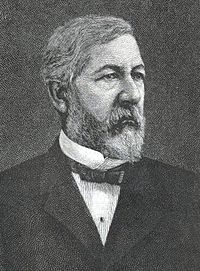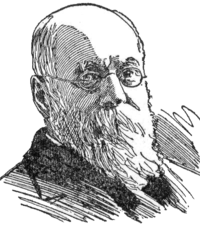- Mugwump
-
 1884 cartoon in Puck magazine ridicules Blaine as the tattooed-man, with many indelible scandals. The cartoon image is a parody of Phryne before the Areopagus, an 1861 painting by French artist Jean-Léon Gérôme.
1884 cartoon in Puck magazine ridicules Blaine as the tattooed-man, with many indelible scandals. The cartoon image is a parody of Phryne before the Areopagus, an 1861 painting by French artist Jean-Léon Gérôme.
The Mugwumps were Republican political activists who bolted from the United States Republican Party by supporting Democratic candidate Grover Cleveland in the United States presidential election of 1884. They switched parties because they rejected the financial corruption associated with Republican candidate James G. Blaine. In a close election, the Mugwumps supposedly made the difference in New York state and swung the election to Cleveland. The jocular word mugwump, noted as early as 1832, is from Algonquian (Natick) mugquomp, "important person, kingpin" (from mugumquomp, "war leader")[1] implying that they were "sanctimonious" or "holier-than-thou,"[2] in holding themselves aloof from party politics.
After the election, mugwump survived for more than a decade as an epithet for a party bolter in American politics. Many Mugwumps became Democrats or remained independents; most continued to support reform well into the 20th century.[3] During the Third Party System, party loyalty was in high regard and independents were rare. Theodore Roosevelt stunned his upper class New York City friends by supporting Blaine in 1884; by rejecting the Mugwumps he kept alive his Republican party leadership, clearing the way for his own political aspirations.[4]
New England and the Northeastern United States had been a stronghold of the Republican Party since the Civil War era, but the Mugwumps considered Blaine to be an untrustworthy and fraudulent candidate. Their idealism and reform sensibilities led them to oppose the political corruption in the politics of the Gilded Age.[5]
Contents
Patronage and politics
 The Mugwumps were Republicans who refused to support Republican presidential candidate James G. Blaine in 1884.
The Mugwumps were Republicans who refused to support Republican presidential candidate James G. Blaine in 1884.
Political patronage, also known as the "spoils system," was the issue that angered many reform-minded Republicans, leading them to reject Blaine's candidacy. In the spoils system, the winning candidate would dole out government positions to those who had supported his political party prior to the election. Although the Pendleton Act of 1883 established the United States Civil Service Commission, and made competency and merit the base qualifications for government positions, its effective implementation was slow. Political affiliation continued to be the basis for appointment to many positions.[6]
In the early 1880s, the issue of political patronage split the Republican Party down the middle for several consecutive sessions of Congress. The party was divided into two warring factions, each with creative names. The side that held the upper hand in numbers and popular support were the Half-Breeds, led by Senator James Blaine of Maine. The Half-Breeds supported civil service reform, and often blocked legislation and political appointments put forth by their main congressional opponents, the stalwarts, led by Roscoe Conkling of New York.
Ironically, Blaine was from the reform wing of his own party, but the Mugwumps rejected his candidacy. This division among Republicans may have contributed to the victory in 1884 of Grover Cleveland, the first president elected from the Democratic party since the Civil War. In the period from 1876 to 1892, presidential elections were closely contested at the national level, but the states themselves were mostly dominated by a single party, with Democrats prevailing in the South and the Republicans in the Northeast. Although the defection of the Mugwumps may have helped Cleveland win in New York, one of the few closely contested states, historians attribute Cleveland's victory nationwide to the rising power of urban immigrant voters.[5]
Historical appraisals
Several historians of the 1960s and 1970s portrayed the Mugwumps as members of an insecure elite, one that felt threatened by changes in American society. These historians often focused on the social background and status of their subjects, and the narratives they have written share a common outlook.[7]
Mugwumps tended to come from old Protestant families of New York and New England, and often from inherited wealth. They belonged to or identified with the emerging business and professional elite, and were often members of the most exclusive clubs. Yet they felt threatened by the rise of machine politics, one aspect of which was the spoils system, and by the rising power of immigrants in American society. They excelled as authors and essayists, yet their writings indicated their social position and class loyalties. In politics, they tended to be ineffectual and unsuccessful, unable and unwilling to operate effectively in a political environment where patronage was the norm.
In a more recent work, historian David Tucker (1998) attempts to rehabilitate the Mugwumps. According to Tucker, the Mugwumps embodied the liberalism of the 19th century, and their rejection by 20th century historians, who embraced the government intervention of the New Deal and the Great Society, is not surprising. To Tucker, their eloquent writings speak for themselves, and are testament to a high minded civic morality.
Origin of the term
Dictionaries report that "mugguomp" is an Algonquian word meaning "person of importance" or "war leader." Charles Anderson Dana, the colorful newspaperman and editor of the now-defunct New York Sun, is said to have given the Mugwumps their political moniker. Dana made the term plural and derided them as amateurs and public moralists.[8]
During the 1884 campaign, they were often portrayed as "fence-sitters," with part of their body on the side of the Democrats and the other on the side of the Republicans. (Their "mug" on one side of the fence, and their "wump" [comic mispronunciation of "rump"] on the other.) Angry Republicans like Roscoe Conkling sometimes hinted they were homosexual, calling them "man milliners." [9]
The epithet "goody-goody" from the 1890s goo-goo, a corruption of "good government", was used in a similar derogatory manner. Whereas mugwump has become an obscure and almost forgotten political moniker, goo-goo has been revived, especially in Chicago, by the political columns of the late Mike Royko.[10]
Noteworthy Mugwumps
- Charles Francis Adams, Jr., president of the Union Pacific Railroad and the American Historical Association
- Henry Adams, author
- Edward Atkinson, entrepreneur and business executive
- Charles William Eliot, President of Harvard University
- E. L. Godkin, editor of The Nation
- Thomas Nast, political cartoonist
- Carl Schurz, former Senator from Missouri and Secretary of the Interior, editor of the Saturday Evening Post
- Moorfield Storey, lawyer and NAACP president from 1909–1915
- William Graham Sumner, social scientist, Yale University
- Mark Twain, author, self-identified as a Mugwump in his essay, Christian Science
- Horace White, editor of the Chicago Tribune
See also
- goo-goo
- Neo-Mugwump
References
Notes
- ^ On-line Etymological Dictionary; The Concise Oxford Dictionary of English Etymology. 1996
- ^ The American Pageant: A History of the Republic, Thirteenth Edition. Advanced Placement edition
- ^ Tucker (1998)
- ^ Henry F. Pringle, Theodore Roosevelt: A Biography. (1931) Page 88.
- ^ a b Summers (2000)
- ^ Hoogenboom (1961)
- ^ Blodgett (1966)
- ^ Sperber and Trittschuh pp 276–7
- ^ Allan Nevins, Grover Cleveland p. 178; Muzzey, Blaine p. 160
- ^ Sperber and Trittschuh pp 173–74.
Bibliography
- Blodgett, Geoffrey T. (1966). The Gentle Reformers: Massachusetts Democrats in the Cleveland Era. Harvard University Press.
- Blodgett, Geoffrey T. "The Mind of the Boston Mugwump," The Mississippi Valley Historical Review, Vol. 48, No. 4. (Mar., 1962), pp. 614–634. in JSTOR
- Blount, Roy Mark Twain's Reconstruction The Atlantic, July 2001.
- Hoogenboom, Ari (1961). Outlawing the Spoils: A History of the Civil Service Reform Movement, 1865-1883. (1982). ISBN 0-313-22821-3.
- McFarland, Gerald W. (1975). Mugwumps, Morals and Politics, 1884-1920. ISBN 0-87023-175-8.
- McFarland, Gerald W.; editor (1975). Moralists or Pragmatists?, The Mugwumps, 1884-1900. ASIN B000FHABUC.
- Nevins, Allan. Grover Cleveland: A Study in Courage (1932)
- Muzzey, David Saville. James G. Blaine: A Political Idol of Other Days (1934)
- Poteat, R. Matthew. (2006) "Mugwumps" in the Encyclopedia of American political parties and elections, By Larry Sabato, Howard R. Ernst, p. 233. ISBN 978-0816058754
- Sperber, Hans. and Travis Trittschuh. American Political Terms: An Historical Dictionary (1962) pages 276–7
- Sproat, John G. (1968). The Best Men: Liberal Reformers in the Gilded Age. (1982). ISBN 0-226-76990-9.
- Summers, Mark Wahlgren. Rum, Romanism, and Rebellion: The Making of a President, 1884 (2000) online version
- Tucker, David M. (1998). Mugwumps: Public Moralists of the Gilded Age. ISBN 0-8262-1187-9.
External links
 Chisholm, Hugh, ed (1911). "mugwump". Encyclopædia Britannica (11th ed.). Cambridge University Press.Categories:
Chisholm, Hugh, ed (1911). "mugwump". Encyclopædia Britannica (11th ed.). Cambridge University Press.Categories:- Political history of the United States
- Algonquian loanwords
- Political party factions in the United States
- Republican Party (United States) terms
Wikimedia Foundation. 2010.

